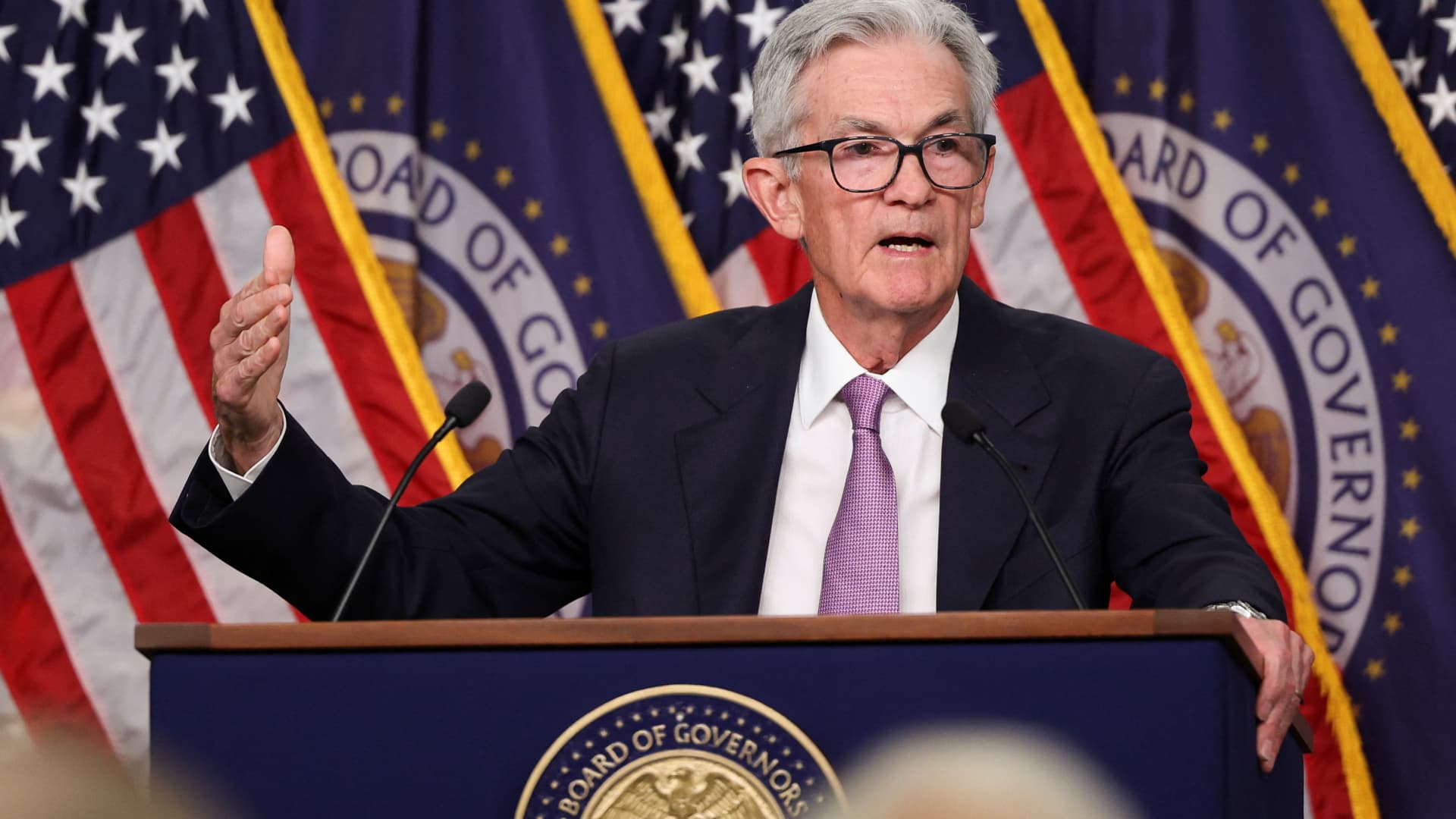Federal Reserve Board Chairman Jerome Powell holds a press conference following a two-day meeting of the Federal Open Market Committee on interest rate policy in Washington, U.S., September 18, 2024. REUTERS/Tom Brenner
Tom Brenner | Reuters
The Federal Reserve likely will stick to the business at hand when it wraps up its meeting Thursday with another interest rate cut, but will have its eye on the future against a backdrop that suddenly has gotten a lot more complicated.
Financial markets are pricing in a near-certainty that the central bank’s Federal Open Market Committee will lower its benchmark borrowing cost by a quarter percentage point as it seeks to “recalibrate” policy for an economy that is seeing the inflation rate moderate and the labor market soften.
The focus, though, will turn to what’s ahead for Chair Jerome Powell and his Fed colleagues as they navigate a shifting economy — and the political earthquake of Donald Trump’s stunning victory in the presidential race.
“We think Powell will refuse to give any early judgment on the implications of the election for the economy and rates, and will seek to be a source of stability and calm,” Krishna Guha, head of global policy and central bank strategy at Evercore ISI, said in a a note issued before the election’s outcome was known.
In keeping with policymakers’ historical desire to stay above the political fray, Powell “will say the Fed will take the time it needs to study the new administration’s plans” then will “refine this assessment as actual policies are developed and enacted,” Guha added.
So while the immediate action will be to stay the course and enact the cut, which equals 25 basis points, the market’s attention likely will turn to what the committee and Powell have to say about the future. The fed funds rate, which sets what banks charge each other for overnight lending but often influences consumer debt as well, is currently targeted in a range between 4.75%-5.0%.
Market pricing currently favors another quarter-point cut in December, followed by a January pause then multiple reductions through 2025.
Preparing for Trump
But if Trump’s agenda — tax cuts, higher spending and aggressive tariffs — comes to fruition, it could have a meaningful impact on a Fed trying to right-size policy after the mammoth rate hikes aimed at controlling inflation. Many economists believe another round of isolationist economic moves from the president-elect could reignite inflation, which held below 3% during Trump’s entire first-term despite a similar recipe.
Trump was a frequent critic of Powell and the Fed during his term, which ran from 2017-21, and is in favor of low interest rates.
“Everyone is on the lookout for future rate cuts and whether anything is telegraphed,” said Quincy Krosby, chief global strategist at LPL Financial. “Also, however, there’s the question of whether or not they can declare victory on inflation.”
Any answers to those questions would be largely left to Powell’s post-meeting news conference.
Though the committee will release its joint decision on rates, it will not provide an update on its Summary of Economic Projections, a document issued quarterly that includes consensus updates on inflation, GDP growth and unemployment, as well as the anonymous “dot plot” of individual officials’ interest rate expectations.
Beyond the January pause, there’s considerable market uncertainty about where the Fed is heading. The SEP will be updated next in December.
“What we’re going to hear more and more of is the terminal rate,” Krosby said. “That’s going to come back into the lexicon if yields continue to climb higher, and it’s not completely associated with growth.”
So where’s the end?
Traders in the fed funds futures market are betting on an aggressive pace of cuts that by the close of 2025 would take the benchmark rate to a target range of 3.75%-4.0%, or a full percentage point below the current level following September’s half percentage point cut. The Secured Overnight Financing Rate for banks is a bit more cautious, indicating a short-term rate around 4.2% at the end of next year.
“A key question here is, what’s the end point of this rate cut cycle?” said Bill English, the Fed’s former head of monetary affairs and now a finance professor at the Yale School of Management. “Fairly soon, they’ve got to think about, where do we think this rate cut period changes with the economy looking pretty strong. They may want to take a pause fairly soon and see how things develop.”
Powell also may be called on to address the Fed’s current moves to reduce the bond holdings on its balance sheet.
Since commencing the effort in June 2022, the Fed has shaved nearly $2 trillion off its holdings in Treasurys and mortgage-backed securities. Fed officials have said that the balance sheet reduction can continue even while they cut rates, though Wall Street expectations are for the run-off to end as soon as early 2025.
“They’ve been happy to just kind of leave that percolating in the background and they probably continue to do that,” English said. “But there’s going to be a lot of interest over the next few meetings. At what point do they make a further adjustment to the pace of runoffs?”

 Blog Post7 days ago
Blog Post7 days ago
 Economics1 week ago
Economics1 week ago
 Finance1 week ago
Finance1 week ago
 Economics1 week ago
Economics1 week ago
 Economics1 week ago
Economics1 week ago
 Personal Finance1 week ago
Personal Finance1 week ago
 Economics1 week ago
Economics1 week ago
 Accounting1 week ago
Accounting1 week ago


















